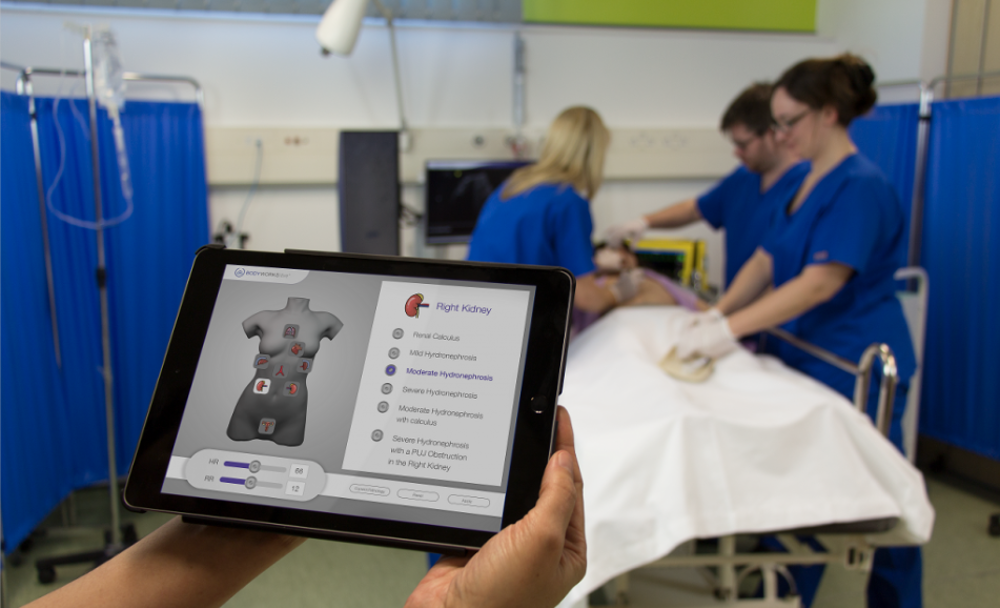Intelligent Ultrasound Group (MED) has published a case study based on feedback from the Veteran's Administration NY Harbor Healthcare Simulation Center in New York, USA. New York is currently the epicentre of the US pandemic and, facing a mounting number of patients, the centre has recently introduced critical care simulation based training sessions utilising the BodyWorks Point-of-Care (PoCUS) Ultrasound Simulator with the newly installed COVID-19 lung module.
These sessions have prepared noncritical care health care professionals including surgery, anaesthesiology, paediatrics and acute care nurse practitioners for roles as bedside ICU providers. The simulation sessions have been made available to all providers scheduled to work in the rapidly expanding COVID-19 intensive care units.
Dr Brian Kaufman, Professor of Anesthesiology, Medicine, Neurology and Neurosurgery at NYU Grossman School of Medicine and Director of the simulation laboratory at VA NY Harbor Healthcare in Manhattan said: "As all the hospitals in the NYU Langone Health system and major affiliates including the Manhattan campus of the NY Harbor Healthcare Center and Bellevue Hospital were being deluged with COVID-19 patients requiring ICU admission and care, there was an overwhelming need for rapid expansion of ICU beds, and providers to care for these patients. These needs were exacerbated when some of our usual ICU clinical providers needed to be removed from the workforce due to the need to quarantine. Having these COVID-19 specific cases available on the BodyWorks Eve ultrasound simulator in the early days of the pandemic has had a significant effect on our ability to quickly train clinicians on lung ultrasound in order to provide better patient care."
Case Study
Facing the global COVID-19 pandemic and a mounting number of patients in need of proper diagnosis, the Veteran’s Administration NY Harbor Healthcare Simulation Center recently introduced critical care simulation-based training sessions utilizing their BodyWorks Eve PoCUS simulator with newly installed COVID-19 lung module. Initiated on March 19, these three-hour sessions have prepared noncritical care health care providers for roles as bedside ICU providers, under the supervision of an intensivist.

[Source: Intelligent Ultrasound]
Dr. Kaufman explained the situation, “As all the hospitals in the NYU Langone Health system and major affiliates including the Manhattan campus of the NY Harbor Healthcare Center and Bellevue Hospital were being deluged with COVID-19 patients requiring ICU admission and care, there was an overwhelming need for rapid expansion of ICU beds, and providers to care for these patients. These needs were exacerbated when some of our usual ICU clinical providers needed to be removed from the workforce due to the need to quarantine.”
Shares in Intelligent Have had a strong rally from 6p during the peak of the Covid-19 crisis to open at 12p today.
The simulation sessions have been made available to all providers scheduled to begin working in the rapidly expanding COVID-19 intensive care units, with no more than six participants scheduled for each three-hour session. The hospital has relied on participants from various departments including Medicine, Surgery, Anesthesiology, Pediatrics (who are now responsible for ICU care up to age 32), and Acute Care nurse practitioners and physician assistants. Dr. Kaufman noted, “As of April 16, we have up-trained a total of 149 participants. The main objectives of the training are to improve the knowledge and comfort level of the participants.”
-
The training is an entirely new skillset for some of the providers and focuses in part on:
-
Use of lung ultrasonography to determine if lung sliding is present or absent using both 2D mode and M mode.
-
Use of lung ultrasonography to evaluate for the presence of A-lines and/or B-lines
Dr. Kaufman mentioned, “We discuss how we try to limit conventional radiographic studies and CT scans in these patients and heavily rely on ultrasound. We then go to the BodyWorks Eve ultrasound simulator and go through the COVID-19 pathologies that have been recently released. I have found them to be extremely useful, and at this point, the learners can compare normal pleural findings and A-lines seen in the first case, to pleural thickening with patchy areas of A-lines with B-lines, to diffuse B-lines and ending up with confluent B-lines. We discuss that you can monitor the progression of the lung disease with bedside sonography, avoiding the need for radiographic studies in many cases.”
This announcement follows news that the Company has also deployed BodyWorks Point-of-Care Ultrasound Simulator (PoCUS) to the NHS Nightingale ExCel Hospital in the UK and successfully raised £5.2m through a placing.
Intelligent Ultrasound is also included in the Vox Covid-19 Crusaders index, which can be found here: https://www.voxmarkets.co.uk/index/vox-covid-19/


